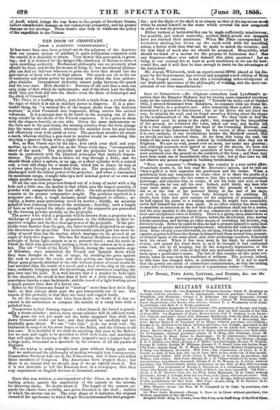RISE OF SEBAsTopoj,.—Mr. Oliphant contradicts Lord Lyndhurst's as- sertion that
the Emperor Nioholas lied for twenty years expended enormous sums on the construction of Sebastopol. "Towards the latter end of October 1852, I entered Sebastopol from Balaklava, in company with my friend Mr. Oswald Smith, in a peasant's cart. After remaining there a short time, we determined to proceed to Bakshiserai ; but as the driver did not know the way., he mistook the road, and we found ourselves triving about the steppe in the neighbourhood of the Malakoff tower. We then tried to find the Bakshiserai road, by going to the right ; but, stopped by the inequalities of the ground, we reiintered the town, asked our way, and finally left it by a road which passes round the head of the Careening Harbour, and thence leads to the Inkerman Bridge. In the course of these wanderings, it is very unlikely, if any fortifications besides the Malakoff existed, that we should not have observed them. So far from this being the ease, the limits of the town were no more defined by fortification than they are at Brighton. We saw no wall, passed over no moat, nor under any gateway ; and, although sentinels were posted in many of the streets, we were not challenged by any of them. -Vast quantities of hewn blocks of freestone were scattered over the ground on the outskirts of the town ; and these may have been made use of immediately after our visit; but at that time we did not observe any person engaged in building fortifications."
"Nom MB TANGERE."—Trading in this country is a very awful affair. If anybody doubts it, let him read Mr. Bouverie's speech, and be will see what a gulf it is that separates the gentleman and the trader. When a gentleman feels any temptation to trade—that is to share the profits of a commercial enterprise—the law comes to him like a certain unmentionable personage, and requires him to assign, if not his body and soul, at least everything else he can call his own. Indeed, until lately, any man who once came under an agreement to divide the proceeds of a venture did so at the risk of his personal liberty to the end of his days, as well as his estate. His very body belonged to his creditors. No doubt, Jack Cade had good reasons for -his suspicion of penmanship ; if he bad signed his name to a trading contract, he might very reasonably never feel himself his own man again. In no other country has there been so manifest an intention in the law that the gentleman shall not be a trader, and the only parallel to the rigour of our commercial code is found in some local and exceptional rules of nobility. There is a pretty story somewhere of a gentleman in some-province of France, before the Revolution, who, having become penniless, and having no other means of recruiting his fortune, was driven to trade. Before he could do this, he bad to present himself to some local assemblage of gentry and deliver up his sword ; which he did with no little die- tress. Some twenty years afterwards, an old man, whom few present could re- cognize, so great had been the change in himselfand those around him, present- ed himself again ut the same place, and, after producing vouchers, demanded back his sword. When it was once more in his hand, he examined it closely, and passed his hand down it, as if he thought it had contracted some rust, not by ill keeping, but by the temporary degradation of the owner;m strongly did even he feel that any mercantile employment was a. stain upon a gentleman's name. The law of this country on this point evi- dently takes its tone from the traditions of noblesse. The jealousy, indeed, by this time has changed sides, as jealousies often do. It is not so that the gentry are afraid of commercial contamination, as that the tradmg classes have hitherto been suspicious of a gentleman trader.— Times,


































 Previous page
Previous page